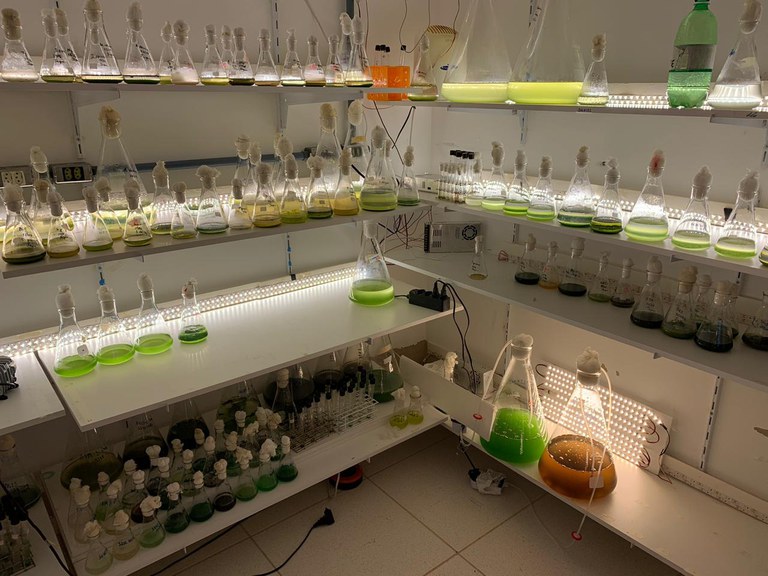Social Insertion
Why studies on ecology and natural resources are strategic to the development of a nation?
The development of any nation depends on the integrity of ecosystem services, such as freshwater supply, climate regulation, and crops pollination, as well as on the integrity of productive chains that rely on native organisms and ecosystems. As examples, we can cite fishing, tourism, timber extraction, among others. Further, countries are involved in a global effort to prospect organisms and substances of industrial interest. The rich biodiversity places Brazil in a privileged position in the search for new biomolecules and new sources of protein to attend the growing global human population, and if properly exploited, this biodiversity can provides Brazil with immense economical advantages. Therefore, the development of research and the capacitation of people in Ecology and sustainable use of natural resources are important for the understanding and conservation of the environmental services, and to increase the socioeconomic benefits that present and future generations can obtain from our biodiversity.
 Water, an essential resource
Water, an essential resource
Ensuring the volume and quality of fresh water supply is an important need of any society, as it is fundamental for human consumption, industry, and agriculture. Furthermore, nearly 75% of the electric power generation in Brazil relies on freshwater reservoirs. Many laboratories of PPG-ERN are dedicated to study different topics of limnology. Among the topics, we can cite the identification of factors that determine the quantity and quality of fresh water in water bodies; the impacts of humans to water quality and quantity; the impacts of different forms of pollution to biodiversity and public health; the determination of acceptable levels of pollutants for different types of water use, as well as ways of depolluting, treating and restoring aquatic ecosystems. Associated with these lines, the program has also been dedicated to conservation, sustainable use and prospecting of fishery resources, as well as to the understanding and conservation of the trophic chains that support these resources. In the face of increasingly frequent water crises, much of the research carried out in the Program has helped directly and indirectly to solve problems related to water supply.
Climate regulation
The current global climate crisis will likely cause the biggest social and economic collapses ever recorded in human history. The rise in the level of oceans, and changes in sea currents and in climate will not only provoke great impacts on biodiversity, but will also imply in unprecedented human migrations and geopolitical changes. To reduce the impacts of this collapse, scientists and governments all over the world have worked in two fronts: i) the reduction of the emissions of greenhouse gases, and ii) the search for ways to remove CO2 from the atmosphere. Researchers from PPG-ERN have long studied biogeochemical cycles in aquatic and terrestrial environments, and have applied this knowledge in the creation of ways to remove carbon from the atmosphere, especially by the use of fresh water algae and macrophytes to absorb carbon. Thus, the PPG-ERN has contributed with alternatives that can slow global warming and its consequences.
Supporting legislations and regulatory agencies
Since ecosystem services and natural resources are common goods on which society as a whole depends, it is up to governments and regulatory agencies to ensure their preservation and sustainable use. To this end, Brazil has an extensive environmental legislation that is largely based on scientific data. Examples are the resolutions from CONAMA (National Council for the Environment), that regulate, among other things, the levels of emissions of different types of pollutants that can cause damages to environments, societies and governments, as well as the standards of ABNT (Brazilian Association Technical Standards), which determine the procedures for the analyses of these parameters. Traditionally, the works carried out by PPG-ERN researchers and students have generated results useful for the continuous construction of Brazilian environmental law, thereby providing support to decision-makers. In addition, several projects are dedicated to the conservation of endangered species, protected by law, at the federal and state levels. Examples are research aimed at understanding the threats, conservation status, and management strategies for preserving endangered organisms.
University and Society
In addition to generating knowledge and training people, PPG-ERN researchers have also played an important role in society, collaborating with private companies, scientific organizations, and councils of the executive branch, with emphasis on participation in:
- State and national action plans for the conservation of endangered species;
- Extension projects that take scientific information to schools and to social media;
- Environment departments at the municipal (local) level;
- Management board for protected areas;
- Coordinating commissions for scientific societies;
- Editorial board of Scientific Journals;
- Organization of scientific congresses and symposia;
- Projects with the industrial sector aiming at CO2 bio-fixation;
- Representation of Brazil on the IANAS Water Committee (Interamerican Network of Academies of Sciences);
- The position of one of its professors as a full member of the Brazilian Academy of Sciences, Prof. Dr. José Galízia Tundisi.
